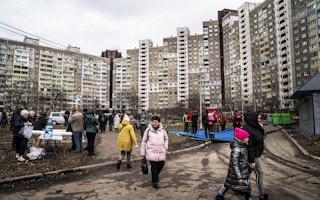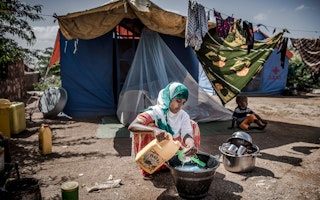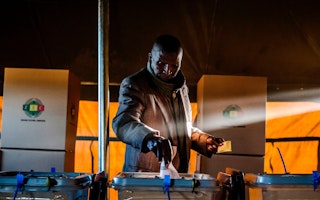Talking Justice: The Trial of Laurent Gbagbo
Laurent Gbagbo, the former president of Ivory Coast, is on trial before the International Criminal Court (ICC) at The Hague, charged with crimes against humanity.
It is the first time the ICC has tried a former head of state. But is the court promoting “victor’s justice,” by putting the former president on trial, while atrocities committed by his rivals go unpunished? And will the trial help or hinder the ICC’s troubled relations with African states?
Our first edition of Talking Justice, a new monthly podcast, looks at the issues raised by the court’s response to the short but brutal conflict in Ivory Coast that erupted after disputed elections in November 2010.
According to Eric-Aimé Semien, director of the Ivorian Observatory of Human Rights in Abidjan: “All the observers noted that the different crimes were committed from both sides, and only one side is prosecuted. And from this point of view, the ICC is disappointing expectations. Because what people want is that the ICC pursue prosecutions against the two different sides.”
Podcast host James A. Goldston, head of the Open Society Justice Initiative, also talks to Mariana Peña, a lawyer who follows events at the ICC for the Justice Initiative, and to Afia Asare-Kyei of the Open Society Initiative for West Africa.
Learn More
Transcript
JAMES A. GOLDSTON:
Talking Justice is a new podcast about justice, human rights, and international law, all of vital concern to Open Society Foundations. I’m Jim Goldston, executive director of the Open Society Justice Initiative, and today we’re talking about a former West African president and the International Criminal Court.
(FOREIGN LANGUAGE NOT TRANSCRIBED)
JAMES A. GOLDSTON:
“Free Laurent Gbagbo.” Until April, 2010, just before this song was written by one of his supporters, he was the president of the Ivory Coast, the former French colony and economic powerhouse, which in recent years has experienced social, political, and ethnic turmoil. And now, former President Gbagbo is on trial before the International Criminal Court in The Hague.
JAMES A. GOLDSTON:
The ICC charges against Laurent Gbagbo arrived from the short but brutal conflict that erupted in Ivory Coast in early 2011, the second civil war in that country in the space of a decade. The fighting broke out after Gbagbo, who had been president since 2000, refused to hand over power to his rival, Alassane Ouattara, who was widely recognized as the victor in the country’s presidential elections.
The conflict cost over 3,000 lives. It ended when French troops helped Ouattara’s forces captured Abidjan, and with it, Gbagbo. In October, 2011, the ICC’s then-prosecutor, Luis Moreno Ocampo, opened an investigation into the violence in the Ivory Coast amid reports that both sides—forces loyal to Gbagbo and to Ouattara—were committing atrocities against civilians.
The next month, Gbagbo was charged with four counts of crimes against humanity, allegedly committed after the December 2010 elections. The charges included murder, attempted murder, rape, and persecution. Gbagbo was rapidly transferred to the ICC in The Hague, where he has been held ever since.
The ICC prosecutor also brought charges against Gbagbo’s main political ally, Charles Blé Goudé, who was transferred to The Hague in 2014 and who is standing trial alongside Gbagbo. Although the ICC has also charged Gbagbo’s wife Simone, she remains detained in Ivory Coast after conviction in domestic court. To date, the authorities in Ivory Coast have refused to surrender her to The Hague. The ICC trial of Laurent Gbagbo and Charles Blé Goudé is scheduled to begin January 28.
JAMES A. GOLDSTON:
But what impact is all of this having in the Ivory Coast, five years after the post-election hostilities began? And how is it likely to affect the ICC, and in particular, its troubled relationship with a number of African governments?
Joining me on the line are two experts who’ve been following the Gbagbo case closely. In Abidjan, Eric-Aime Semien, who runs the Ivory Coast Human Rights Observatory. Hello, Eric. Welcome to the show.
ERIC-AIME SEMIEN:
Hello.
JAMES A. GOLDSTON:
And from The Hague today, we have Mariana Peña, a lawyer who works for the Open Society Justice Initiative, monitoring developments at the International Criminal Court. Mariana, welcome.
MARIANA PEÑA:
Thank you.
JAMES A. GOLDSTON:
Eric, if I can turn to you first, how closely are people in the Ivory Coast watching the events in The Hague and the trial of Laurent Gbagbo?
ERIC-AIME SEMIEN:
Let me tell you that after the post-election crisis that occurred five years ago, the sociopolitical tensions are still deep-seated, so that the view everybody has from the Gbagbo process, from the Gbagbo trial depends on which side they are. Some think that Mr. Gbagbo is a murderer that should be detained. And some others also think that he is innocent and that he should be free from The Hague. These are the two main opinions in Cote d’Ivoire.
JAMES A. GOLDSTON:
And how do people view the International Criminal Court proceedings in particular, given that there is such a great divide among parts of the population?
ERIC-AIME SEMIEN:
The Ivorian population had different expectations from the ICC, but a lot of expectations have been disappointed because there is a real need of justice after what occurred in Cote d’Ivoire. At the beginning, the ICC was appearing as a court which would promote justice for everybody, but right now, the fact that after four years of prosecutions, all the prosecutions are only against people from the same side. Mr. Gbagbo is prosecuted, his wife, Mrs. Simone Gbagbo, is also prosecuted, and the leader of the youth political party, Mr. Ble Goude, is prosecuted.
As for many [UNINTELLIGIBLE] citizens, these are prosecutions on an unfair basis, because all the observers noticed that the different crimes were committed from both sides, and only one side is prosecuted. And from that view, the ICC is disappointing the expectations, since what people want is the ICC to fulfill prosecutions against the two different sides.
JAMES A. GOLDSTON:
Can you say, briefly, what have the Ouattara forces done that would merit prosecution?
ERIC-AIME SEMIEN:
Several human rights reports—from Amnesty International, from Human Rights Watch, from FIDH—showed that at the same moment, Gbagbo forces and the Ouattara forces committed similar crimes, such as murders, such as rape, such as crimes against humanity, and the crimes were committed at the same moment during the post-election crisis. And for the moment, the ICC prosecutions are only based on crimes which are supposed to have focused only on Abidjan, the main town of the country. Whereas, many crimes have been committed in the western part of the country by the Ouattara forces.
JAMES A. GOLDSTON:
Mariana, having heard now what Eric has said about opinion in the in Ivory Coast, what do we know about the ICC’s proceedings? What do we know about why, to date, the ICC has focused only on one side of the post-election conflict?
MARIANA PENA:
It is true that the ICC has focused only the Gbagbo side of the conflict, and although the Office of the Prosecutor has said repeatedly that he was going to investigate the other side of the conflict, it hasn’t done so. The reason for that, as far as we know, is financial restrictions, financial constraints in the ICC’s budget. The prosecutor has said repeatedly that she would like to investigate the other side but that she doesn’t have the money to do so.
JAMES A. GOLDSTON:
Mariana, in other situations, the ICC has encountered government resistance to its investigations. Does that factor affect the way the ICC investigation has proceeded on Ivory Coast?
MARIANA PENA:
It’s difficult to say, because we have public statements from the prosecutor and members of her office saying that they will proceed with investigations against the other side. And then in practice, there are no such investigations, or we know that the investigations have probably started, but are not being pursued.
And we hear that a reason for that may be lack of resources, but we don’t know whether in practice there are other considerations that are making it so that the Office of the Prosecutor is not moving forward. And as I said, cooperation and the possible impact of investigations and prosecutions is something that could be under consideration, but we actually don’t know.
JAMES A. GOLDSTON:
So Eric, if I may, in March, Simone Gbagbo, who some call the “Iron Lady,” was convicted along with a number of others for offenses against the State. That trial, according to the High Commissioner for Human Rights, exposed structural deficiencies in the Ivorian judicial system that needed to be urgently addressed.
Have those questions about the national justice system been addressed? And if not, what confidence to people have that the national system can actually take forward effective investigations and prosecutions of the post-election violence?
ERIC-AIME SEMIEN:
What I can say about this trial that opened last March is that it was not a fair trial. The rights of the defense were not really respected. And the sentence we heard did not reflected at any moment the way the trial was conducted. For instance, some witnesses could not even recognize the people they accuse.
JAMES A. GOLDSTON:
The International Criminal Court has asked that the government of Ivory Coast transfer Simone Gbagbo to The Hague, but as of now, that hasn’t happened. Should the government transfer Simone Gbagbo to the ICC?
ERIC-AIME SEMIEN:
Yes. We really think that Simone Gbagbo should be transferred to The Hague because the prosecution at The Hague offer more guarantees for a fair trial. The second guarantee is that we expect the ICC to prosecute people from the other side, from the Ouattara side.
And if they start refusing to transfer Simone Gbagbo to The Hague, we guess that they will also refuse transferring other people to The Hague when they are required to, the government will refuse on the protest that they also refuse to transfer Simone Gbagbo.
President Ouattara, he announced that nobody should will no longer go The Hague, and this is a sentiment we disagree on because it’s not up to him to decide who is going to The Hague or not. We think that when Cote d’Ivoire decided to bring this party to [UNINTELLIGIBLE], it had an obligation to cooperate and to fulfill all of its obligations to the ICC.
JAMES A. GOLDSTON:
Thank you very much, Eric. I want to thank you both for taking part in this conversation. That’s Eric-Aime Semien, who runs the Ivory Coast Human Rights Observatory in Abidjan, and Mariana Peña, a lawyer with the Open Society Justice Initiative, based in The Hague. Thank you.
MARIANA PENA:
Thank you.
ERIC-AIME SEMIEN:
It’s my pleasure.
JAMES A. GOLDSTON:
How are the ICC proceedings in Ivory Coast perceived across West Africa, and how will they affect the ICC’s troubled relationship with some African governments? Joining me on the line is Afia Asare-Kyei, based at the Open Society Initiative for West Africa in Dakar. Afia has been following the Gbagbo case, and more broadly, justice and truth efforts in Ivory Coast for several years. Afia, welcome to the show.
AFIA ASARE-KYEI:
Thank you very much, Jim.
JAMES A. GOLDSTON:
Afia, how would you assess the relationship between the Ouattara government and the ICC right now?
AFIA ASARE-KYEI:
I think that there is a tense situation between the court and the Ouattara administration, but their refusal to hand over Madame Gbagbo to the ICC as well as the fact that so far nobody from the Ouattara camp has been handed over to the ICC has really caused a deep, deep fractionalization in the Ivorian society, and further, just reinforces this whole perception that Ouattara’s government is pursuing a victor’s justice.
JAMES A. GOLDSTON:
Afia, what can you say about the role of Guillaume Soro? Of course, he was involved in the first Ivory Coast civil war in 2002. He then became prime minister, and for the last few years, has been president of the National Assembly. But a number of people believe he may be in the ICC’s sights?
AFIA ASARE-KYEI:
So, the President of the National Assembly of Cote d’Ivoire Guillaume Soro, was the head of the rebellion, or the rebel forces who fought for Mr. Ouattara. In fact, as we speak, there is an international arrest warrant issued by the Republic of Burkina Faso against Mr. Soro for his perceived role in last year’s coup d’état Burkina Faso.
So at some point, we are hoping to see that Mr. Guillaume Soro will appear before a court of law, whether it is in Cote d’Ivoire, whether it is in The Hague. But that Mr. Guillaume Soro will be appear before court to really answer for his perceived role in the crimes that were committed during both the rebellion, as well as the post electoral conflict.
Now, I do think that if Mr. Guillaume Soro does go to the ICC, it will, perhaps, change the perception that the Ouattara government is pursuing a victor’s justice or a winner’s justice in Cote d’Ivoire. It will certainly change the narrative of Ivoirians who think that it is only the Gbagbo camp that is being punished because they were the losers. And so it’s more a winner’s versus a loser’s justice that is being pursued in in Cote d’Ivoire.
JAMES A. GOLDSTON:
Laurent Gbagbo is the first former head of state to be taken into custody by the ICC. Is this trial likely to strengthen or weaken support for the court in Africa?
AFIA ASARE-KYEI:
I do believe that the Gbagbo case is very, very important for accountability on the Continent. It’s important to demonstrate that powerful individuals responsible for the suffering of ordinary men and women cannot go scot-free. It is important because it is a demonstration that victims of brutal crimes—communities that have been terrorized and their lives shattered—can have justice.
However, it is an undeniable fact that Africa has been a focus of most of the court’s work thus far. I don’t think that the ICC is necessarily targeting Africa. It just so happens that a lot of its caseload has been on the continent. The ICC needs to do more to get Africans to believe that the court is not against Africa, that their work is about justice.
JAMES A. GOLDSTON:
That’s been Afia Asare-Kyei at the Open Society Initiative for West Africa in Dakar. Thank you very much.
AFIA ASARE-KYEI:
Thank you, Jim.
JAMES A. GOLDSTON:
So while this trial will address the fate of two men accused of very serious crimes, it seems unlikely to end the questions about the ICC or its role in Africa. As we have heard, the court could no doubt use additional resources to pursue investigations and broaden its public outreach in Ivory Coast.
ICC member states could do more to help. But real challenges remain. Just last April, President Ouattara declared, “No one else will be going before the ICC. We will judge them here.” If that is so, how can the ICC, which has until now focused on only one side of the conflict, deliver justice that is perceived to be fair and impartial? And how can domestic courts in Ivory Coast be empowered to prosecute and try international crimes committed by both sides, which our discussion today makes clear is critical?
Or will it be left with just half the story? The trial of Laurent Gbagbo and Charles Blé Goudé seems likely to last for several months. If you wanna follow what happens, you can sign up for updates from our trial monitoring service, InternationalJusticeMonitor@IJMonitor.org. That’s IJMonitor.org.
Okay, that’s it for me. I’m Jim Goldston, executive director of the Open Society Justice Initiative, part of the Open Society Foundation. Please join me next month for another edition of Talking Justice.


